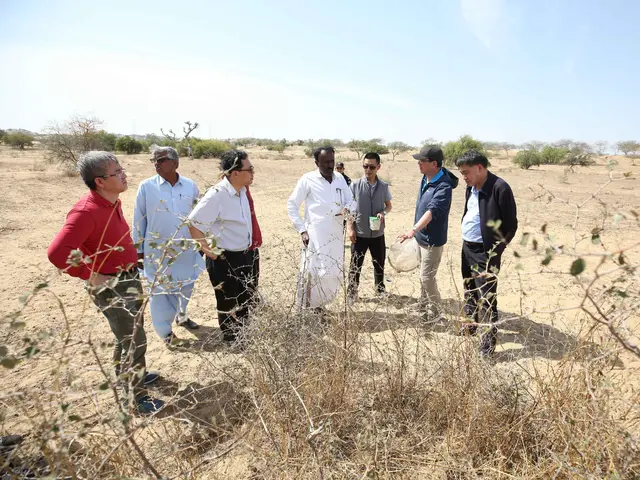Shafiq Ahmad, a Pakistani farmer in Pakistan's eastern district of Okara, faced a sudden locust swarm attack at his fields in January this year, which completely devastated his wheat crop leaving him in the lurch of debt and future financial sufferings.
"In one morning, when I returned home after milking my cows and buffalos, I surprisingly saw a black cloud moving fast over our heads. Later, somebody told me it was a locust swarm and it had attacked my fields. I rushed there and saw them in billions in numbers eating my young wheat crop," the 45-year-old farmer from village 7/4-L of Okara district of eastern Punjab province told Xinhua on Thursday.
Ahmad said, "It was a new thing, we did not know how to respond properly. We tried to push them away but failed. And in a couple of days, they ate my wheat crop at six acres where I have invested around 90,000 rupees (around 584 U.S. dollars) and was expecting an income of 384,000 (around 2,490 U.S. dollars)."
Ahmad and other farmers contacted the local agriculture department, and the officials suggested villagers spray some pesticides over the locusts, but the villagers did not have enough resources for such a huge swarm.
A number of Pakistani farmers like Ahmad in different areas whose crops were destroyed by locust are very anxious to make payments for seeds and fertilizers they borrowed, and how to meet their family expenditures and start afresh sowing season.
Desert locust swarms entered into Pakistan's southern Sindh province last year before moving to the eastern, northwest and southwest regions of the country.
According to official figures, the locust swarms have caused 15 percent loss to crops amounting at least 100 billion rupees (around 650 million U.S. dollars) since last year by affecting around 30 million acres of land out of which only 300,000 were sprayed in the country.
Later in January, local media and parliamentarians raised the issue, followed by a high-level meeting chaired by Pakistani Prime Minister Imran Khan early last month. National Food Security Minister Makhdoom Khusro Bakhtiar described the current worst situation to the meeting, fearing that if the plague is not controlled it can destroy all crops at 38 percent of the country's total agriculture land in the coming months.
The prime minister imposed a national emergency on locust control and asked the minister to seek help from China. The government of China sent an emergency response team of experts on Feb. 24, which has visited almost all affected areas, including Tharparkar desert in southern Sindh province, southwest Balochistan province and different affected districts of Punjab where locusts have already laid eggs.
Chinese experts have conducted field surveys, analyzed the situation, and are now helping Pakistan develop an emergency assistance program and develop a sustainable system and mechanism to prevent and control the locust attacks as well as to establish long-term cooperation with Pakistan.
The Chinese working group has said that China would provide a comprehensive emergency assistance package to Pakistan against swarm attacks with the first batch of chemical pesticide expected to reach Pakistan next week.
Wang Fengle, chief expert of the Chinese team, told a press conference that China has vast experience and expertise in fighting and controlling the locust successfully with the help of a sustainable system, adding that the Chinese government attached great importance to the national emergency on locust in Pakistan.
A farmer from village Rakh Shah Hussain of district Khushab, named Asghar Khan, told Xinhua that they are afraid of the destruction locusts can do to their gram crop in the coming days, saying, "Our whole year's livelihood depends on these crops and the locust swarm is posing a great threat to it."
However, he expressed his satisfaction after watching the Chinese team in his area, saying, "We know that it is quite a difficult task, but we are sure that the Chinese experts would help us."
Director-General of Agriculture Department of Punjab Anjum Ali who is looking after the anti-locust campaign in Punjab told Xinhua that it is a new challenge for Pakistan, specifically in the crops zone and they want a Chinese solution to address the problem backed by information and communications technology.
The director-general said, "We are highly encouraged that the Chinese team is with us," adding that "we are more inclined to learn from the Chinese experience, avail modern technology, equipment, take technical assistance for a sustainable system."
Xu Yubo, an official of international cooperation department of the Chinese Ministry of Agriculture and Rural Affairs, said that the China working group has chalked out a comprehensive desert locust control program backed by efficient low-toxic pesticides, spraying vehicles, plant protection drones, surveillance equipment, deputation of professional teams, sustainable personnel training, low altitude agriculture aircraft and biological pesticides.
(by Jamil Bhatti)
 简体中文
简体中文

